'Southgate deserves respect but was not the winner England wanted'
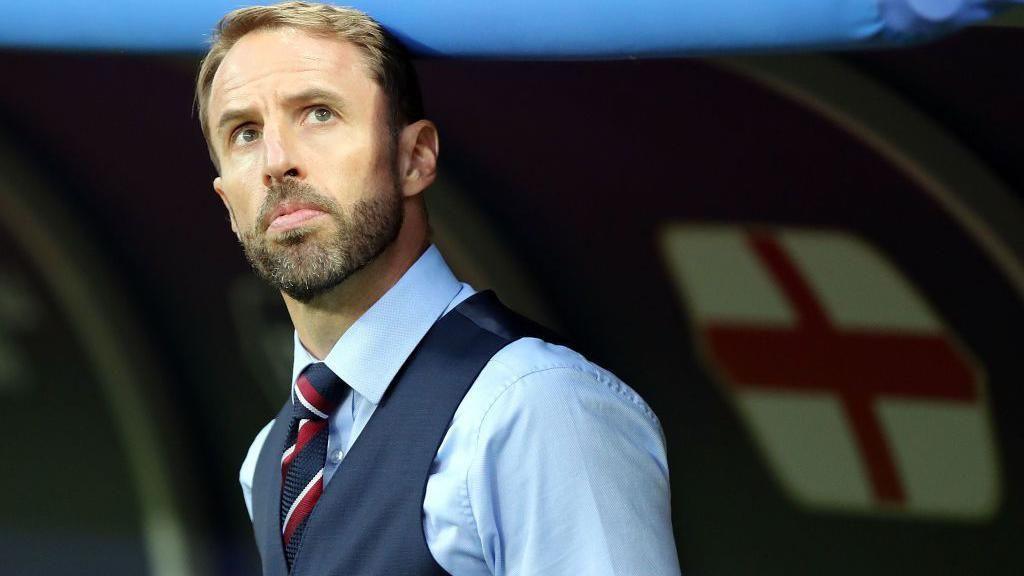
Gareth Southgate leaves England with a managerial record of played 102, won 61, drawn 24, lost 17 - a 59.8% win rate
- Published
Gareth Southgate’s eight years as England manager will be judged as an age of progress in many areas, but ultimately one of falling agonisingly short when it came to claiming the big prizes.
Southgate leaves following the Euro 2024 final defeat by Spain, with a better record than anyone in the job since 1966 World Cup winner Sir Alf Ramsey, deserving total respect for the manner in which he handled the unique pressures of being England manager.
And England’s consistent appearances in the latter stages of major tournaments was a sharp contrast to the fallow years of embarrassing exits under predecessors Fabio Capello and Roy Hodgson - the one-match reign of Sam Allardyce being the Football Association’s “blink and you missed it” moment.
This is why Southgate can leave with his head held high, and able to reflect on a fine body of work that restored England as a serious proposition on the global stage.
There is no escape, however, from the brutal reality that when measured against the opportunities which presented themselves in four major tournaments, along with the talent at his disposal, Southgate could not lead England over the line.
It may be a harsh judgement to regard Southgate as a nearly England manager leading a nearly England team, but that running theme of close, but not close enough leaves him open to those charges.
Legacies are shaped by such fine margins.
If England had beaten Spain in Berlin to win their first major men’s trophy for 58 years, Southgate would have been transformed from a maligned figure - facing hostility and flying beer cups in Cologne after England failed to beat Slovenia in the group stage - to a national hero and sporting icon.
Instead, Southgate’s record of near misses meant England and the Football Association could not find the managerial winner they have craved since 1966.
Southgate resigns after England's Euro 2024 loss
- Published16 July 2024
Best since Ramsey? How does Southgate's record compare?
- Published16 July 2024
Southgate’s peak of popularity arguably came between 2018 and 2021 when he led England to a surprise World Cup semi-final against Croatia in Moscow and then a Euros final against Italy at Wembley - but both were lost from winning positions, the manner of those defeats used as prime examples of the occasional tactical inertia and conservatism that provided a regular backdrop to his regime.
He placed England back to what had become alien territory in the previous decade of the latter stages of major tournaments, but was still treated with scepticism in some quarters. The latest gallant loss to Spain in Berlin’s Olympiastadion means Southgate could not pull off the history-making triumph that would change those minds.
In the wider context, Southgate was a calm, measured personality who achieved the not inconsiderable feat of making a nation fall in love with its football team once more, leading with dignity on and off the field, demonstrating a willingness to tackle thorny subjects away from the playing arena with his measured words on racism and other issues.
The modern England manager must have a wider hinterland than simply football as all issues are now seen as fair game for his views. Southgate possesses it, serving him and the Football Association well when the game’s waves spread beyond the pitch.
Southgate was the subject of a successful West End production Dear England, the title taken from an open letter he wrote to England’s fans before Euro 2020. A post-Germany plot revision of the piece will not have the happy ending writer James Graham hoped for, as Southgate’s England could not deliver the winning storyline against Spain.
The relationship between Southgate and England fans was sometimes uneasy, as seen in those angry scenes against Slovenia, but such is the fickle nature of that volatile union that he was dancing in front of those same supporters receiving raucous acclaim after Switzerland were beaten on penalties.
He was serenaded by supporters during those heady days between 2018 and 2021, then singled out for fierce criticism when the expectations he helped to raise were not fulfilled, such is the precarious existence of England’s manager.
Southgate suffered personal abuse from supporters that made him question his future before and after the Qatar World Cup in 2022.
But the 53-year-old’s time in charge must always be viewed through the prism of what he inherited when England’s former under-21 manager agreed a four-year contract in November 2016.
The FA was in chaos following Sam Allardyce’s one-game reign in succession to the humiliated Roy Hodgson, who presided over the national embarrassment of defeat by Iceland at Euro 2016.
England’s direction of travel was a rapid downhill spiral after the failures of predecessors Capello and Hodgson. Southgate privately distanced himself from succeeding Hodgson before accepting a four-year contract to take over after the turbulent 67 days of Allardyce.
Mature and civilised, Southgate rarely lost his composure and was at ease under the fierce scrutiny accompanying his status, England’s new manager quickly embarking on a period of culture change
Southgate delivered an opening mission statement insisting England had to “get off the island” and learn from elsewhere, particularly the German model of strong connections between the DFB (German football association) and the domestic Bundesliga.
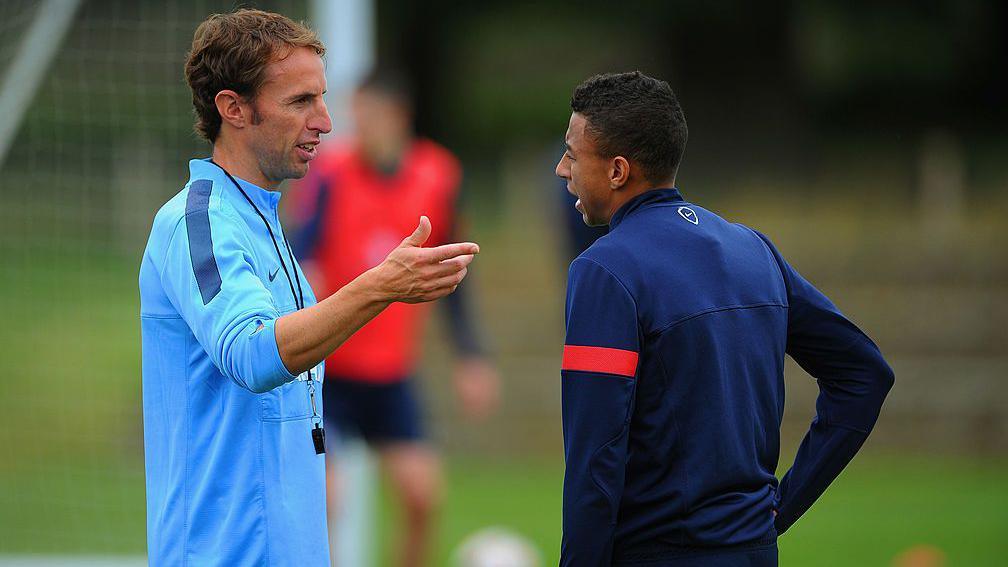
Gareth Southgate was England Under-21 manager before taking the senior role
Southgate’s first game in permanent charge - after four as interim manager - was a 1-0 friendly loss to Germany in Dortmund in March 2017. He gave new caps to defender Michael Keane and midfielders Nathan Redmond and James Ward-Prowse on the start of a journey to England’s first World Cup semi-final since 1990 in Moscow the following summer.
From the angst and discontent of the debacle at Euro 2016 in France under Hodgson, Southgate’s more collegiate and open approach changed the mood instantly.
Capello's fierce, brusque style and the rigid repetition of Hodgson’s methods were out. Southgate’s modern outlook was in.
England’s players felt the weight of the shirt, so often referred to as an impossible burden by Capello, lifted. They were happy to represent their country again.
As his England renewal took shape, those who played for Southgate admired and respected him as someone who was loyal, who backed those players who produced for him, and would be prepared to act as a willing shield for them when the criticism, as it invariably does, started to fly.
Who will be next England manager?
- Published16 July 2024
How much do you know about Southgate's time as England boss?
- Published16 July 2024
'Thank you Gareth - you gave a nation new memories'
- Published16 July 2024
He showed private and public support for Harry Maguire, a key figure in England’s renaissance, who became a figure of mockery for his own and opposition supporters. It was seen with his loyalty to Kalvin Phillips, who was a central figure in the Euro 2020 finals but fell from grace spectacularly after moving to Manchester City, and then West Ham United on loan. He was only excluded when Southgate could no longer justify his inclusion.
Southgate was at the forefront on a shameful night in Sofia in October 2019, when a Euro 2020 qualifier against Bulgaria, which England won 6-0, was stopped twice after Tyrone Mings and Raheem Sterling were targeted for vicious racist abuse.
And those of us who witnessed Southgate dealing with hostile Bulgarian questioning, with some locals denying there was a problem, could not fail to be hugely impressed. Southgate made his point while always issuing the caution that England had problems of its own in this regard and must not believe it was something that only existed elsewhere.
It was the reaction of a serious, decent person who saw his role at the FA as more than just the manager of the senior football team.
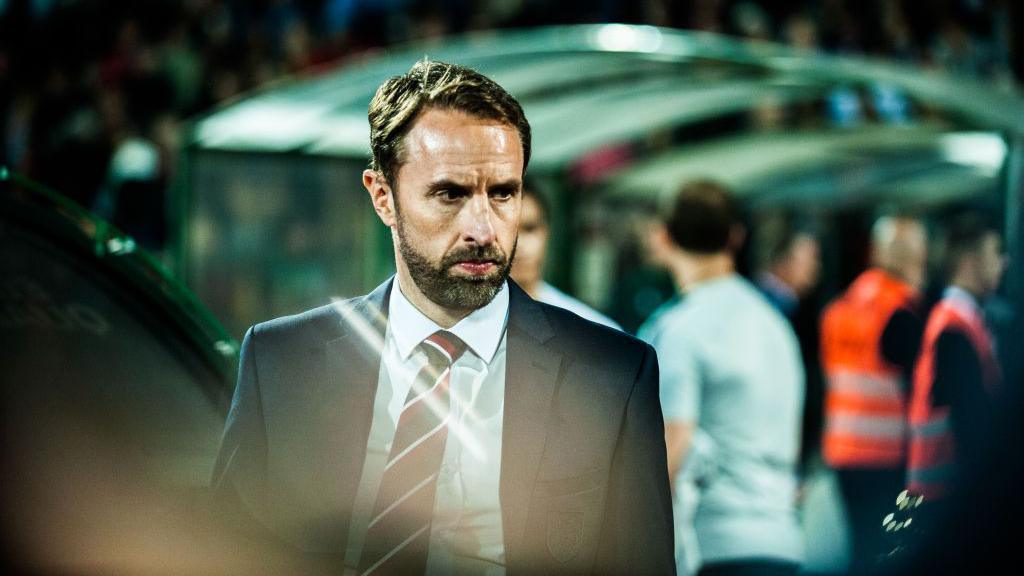
Southgate was put in temporary charge of the senior England team on 27 September 2016
He had already made his mark before taking the job permanently, showing the hidden steel that lurked beneath the smooth exterior, by effectively ending the England career of then all-time leading goalscorer and captain Wayne Rooney by dropping him for a World Cup qualifier in Slovenia. Rooney only figured three more times as he was eased aside, the last a ceremonial farewell in a friendly against Scotland.
For a manager incorrectly tagged as “too nice” to take tough decisions, Southgate never shied away. It was seen when Sterling’s international career was brought to an abrupt close after the 2022 World Cup, then when Ben Chilwell, Jack Grealish, Jordan Henderson and James Maddison were cut from the Euro 2024 squad.
The media, kept at arm’s length and operating under an apparent “give them nothing” restriction at Euro 2016, were welcomed into England’s Russian World Cup base two years later. They were even invited to play darts against Southgate’s squad, a tradition that was maintained here in Germany, along with a football match between the media and England’s backroom staff, managed by Kieran Trippier.
Even the sight of Southgate with his arm in a sling after dislocating his shoulder, after falling over while out running, was only a bump in the road as England were a surprise package, reaching the semi-final only to lose to Croatia in extra time after taking an early lead through Trippier’s free-kick.
England lost control of a game they had in their grasp. It was a flaw they displayed too often in the big moments under Southgate and led to doubts about his game management and tactical flexibility against high-class opposition.
The unlikely nature of England’s campaign made Southgate and his squad hugely popular, the manager’s trademark waistcoat transforming him into something of a fashion icon.
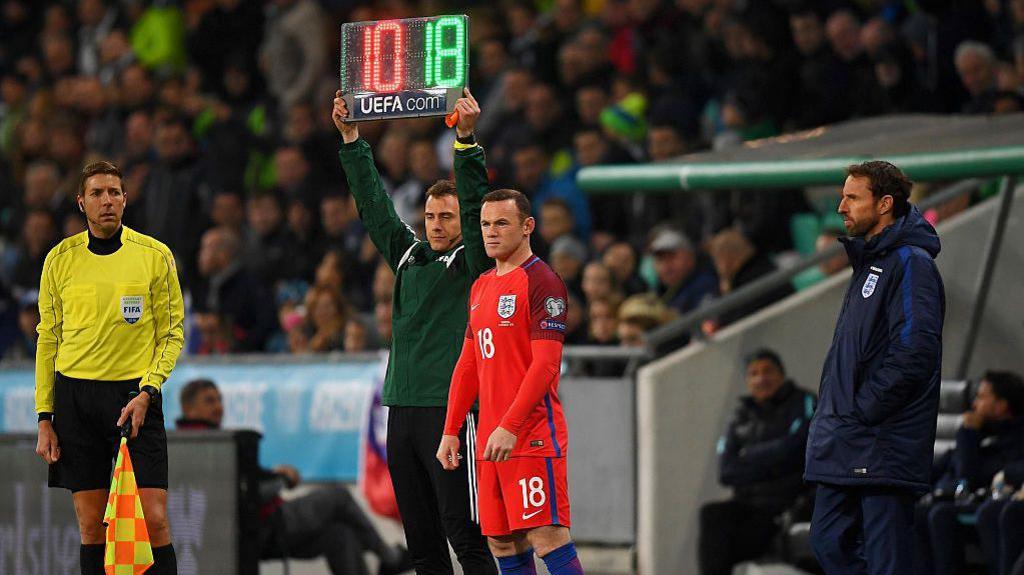
Southgate dropped England captain Wayne Rooney in his second game in charge, giving him 17 minutes off the bench in a 0-0 draw in Slovenia
If there was one game in Southgate’s reign that summed up where the fault lines lay, it was the great missed opportunity of the Euro 2020 final against Italy at Wembley. This will surely be the game of biggest single regret, even ahead of Sunday’s loss in Berlin.
England were effectively presented with a home tournament, just one game being played away from Wembley in Rome, where Ukraine were thrashed 4-0 in the quarter-final.
After Denmark were beaten in the semi-final, England once again went ahead through Luke Shaw after two minutes but, as against Croatia and in a familiar pattern under Southgate, they went into retreat, allowing an Italy side that was hardly vintage to dominate, equalise then take the final to penalties.
England allowed matters to drift - Southgate waiting until extra time to introduce Grealish - then the later stages to bring on Jadon Sancho and Marcus Rashford, who barely had any time to get attuned to the occasion, then missing penalties in the shootout England lost.
England’s painful loss was the final straw on a dreadful day marred by fan disorder, with ugly scenes inside and outside Wembley. What could have been a golden day for Southgate, a defining moment for manager and players, was a nightmare as the shadow of racism hung over the aftermath when Rashford, Sancho and Bukayo Saka were shamefully abused after missing penalties in the shootout.
By the time the following summer rolled around, the first signs that Southgate was falling from favour with a once-adoring public could be seen and heard.
Southgate may have sensed it himself as he talked of “not outstaying my welcome” before a Nations League meeting with Hungary at Molineux. If he had not, he soon got the message as he was subjected to personal abuse after a 4-0 loss, with chants also echoing around the stadium.
It had a profound effect on a manager who saw strength in unity - management, players and supporters - and was always aware of the danger of him becoming a divisive figure.
Once again, this was a recurring theme.
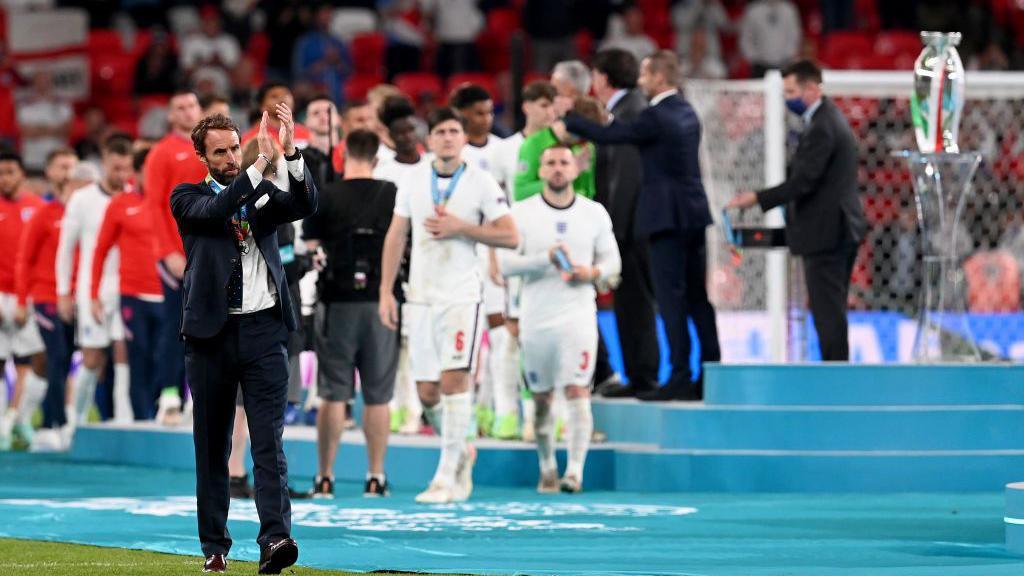
Southgate took the England men's team to a first major final since 1966, losing Euro 2020 on penalties to Italy at Wembley
Southgate considered leaving once more after the World Cup quarter-final loss to France in Qatar. Indeed many inside the FA were quietly convinced the search for a new manager would soon be an item on their agenda.
The sympathetic and positive response to England’s efforts in Qatar shaped his decision to stay, with a contract signed to take him through Euro 2024 to November.
In Germany, there had been an “end of days” feel to a flat, disjointed campaign, with Southgate losing touch on tactics and feeling fan hostility again.
Southgate, normally so assured when faced with the awkward, searching questions, found his voice faltering when asked about the abuse, which played into all his fears about becoming someone who would split supporters and his team.
He took bold decisions to include youngsters Kobbie Mainoo from Manchester United and Crystal Palace’s Adam Wharton in England’s squad but did not appear to have a clear midfield plan, describing his flawed strategy to play Liverpool’s Trent Alexander-Arnold in the middle as an experiment.
Southgate also received criticism from outside for name-checking Kalvin Phillips as a key absentee, but this was unjust. He, in fact, stated England were missing a Phillips-type reliable, physical holding player, not Phillips himself.
He was presented with a generational talent in Jude Bellingham, alongside Premier League Player of the Season Phil Foden and England’s all-time record scorer Harry Kane, who looked so out of sorts in Germany - but struggled in vain to reach a formula, a manager seemingly running out of inspiration.
Gareth Southgate had simply run out of road as England manager.
He could not take England to a place they have craved since 1966 – but Southgate leaves with them in a much better place than when he arrived, and with a record that makes him the country’s second greatest manager since Ramsey.